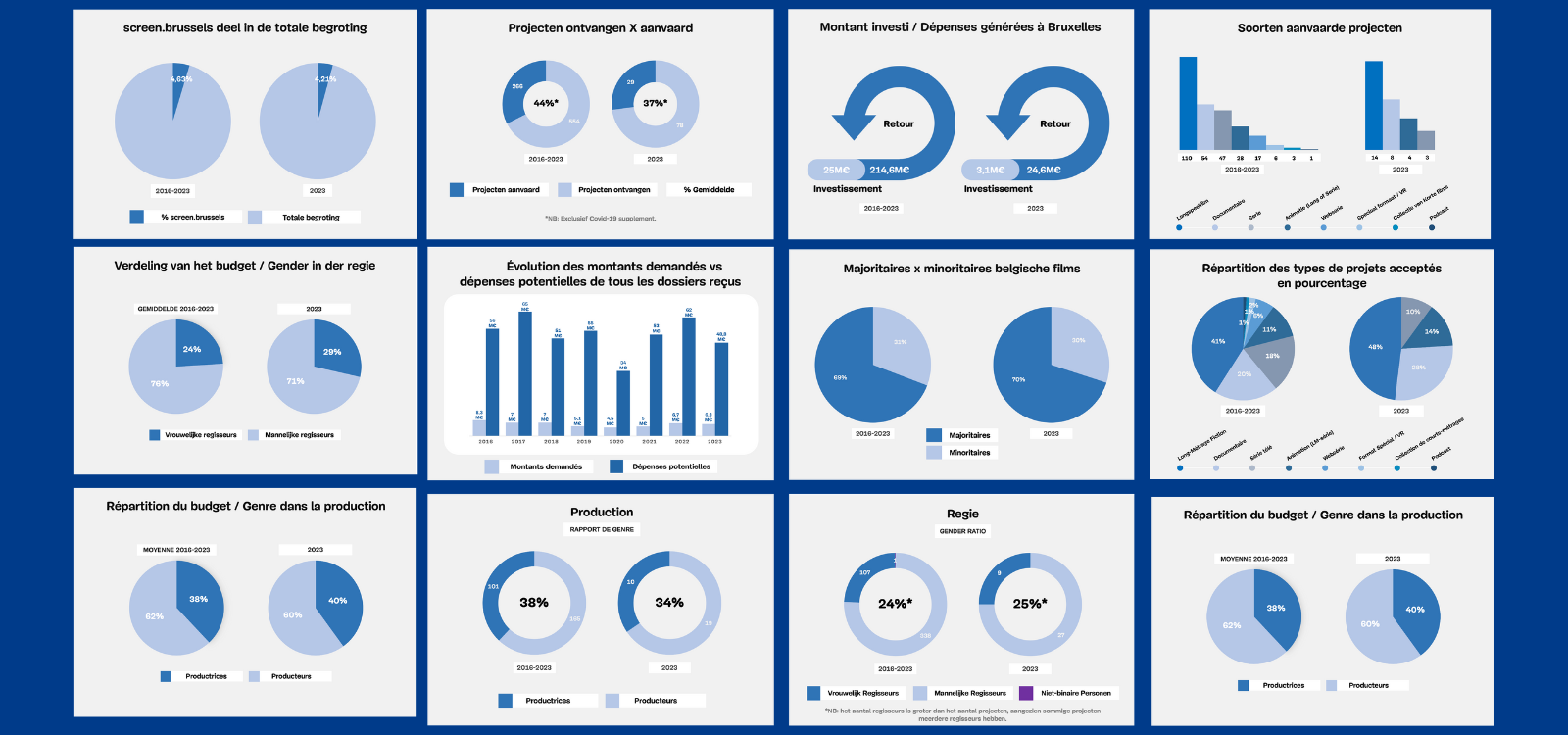Brussels, capital of the audiovisual sector
As 2023 draws to a close, screen.brussels presents the results of the Brussels-Capital Region's investment in the film and audiovisual sector, putting many talented people to work and filling the order books of specialized companies. Looking at investments in 2023, as well as trends since the mechanism was created in 2016, we can see that the regional fund is strengthening its role as a vital support for the cultural and creative audiovisual industry, and hence for the regional economy.
"As we look at screen.brussels' activities, I'm delighted with the efficiency of the system we've put in place, for the benefit of talent and companies in the Brussels-Capital Region. This year, more than 3 million euros were invested in 29 projects that should generate at least 24 million euros in direct audiovisual expenditure. Since 2016, at least 206 companies in the sector have been created or relocated in the Region. What's more, 69% of the projects supported were directed by Brussels residents, and 74% were produced by Brussels-based production companies," says Minister-President Rudi Vervoort.
Once again this year, the support mechanism bore fruit, with investment in 29 projects: 14 feature films, 4 animation projects, 8 documentaries and 3 series.
Highly sought-after, competitive support
With a selection rate hovering around 37% (or even 30%, if we temper this with the many documentaries in session 22), screen.brussels' investment was called upon 78 times, proving highly competitive for production companies. The investment fund supported 29 projects, 76% of which were submitted by production companies based in Brussels (14% in Wallonia and 10% in Flanders). Total applications (for an available budget of €3.1M) amounted to €6.3M, with pledged expenditure of almost €50M in the audiovisual sector alone. It should be noted that screen.brussels is the only regional fund partner in 80% of the projects.
Confirmed and emerging talent
Through its investment in projects, screen.brussels is able to employ numerous talents - and service companies - in the Brussels-Capital Region. For example, Solange Cicurel (TKT), Fabrice Du Welz (Maldoror) Guillaume Senez (Une part manquante), Stéphane Liberski (L'art de rien) or Savina Delicour and Vanya Leturq (Pandore, season 2). But we're also counting on emerging talents - most of whom testify to the multicultural aspect of Brussels - such as César Diaz (Mexico 1986), Jawad Rhalib (Puisque je suis née), the Hamou brothers Ish and Monir Hamou (BXL), Jonas d'Adesky (Temps morts) and Maja Ajmia Yde Zellama (Têtes Brûlées). Ditto for the production companies supported, between regulars (Artemis, Kwassa, Scope, Wrong Men,Umedia, Vivi Film, Panique !) and first-time submissions from Kozak film, R&R production, Panenka BXL.
European co-production not left behind
The Belgian film and audiovisual sector is traditionally inclined towards co-productions with its European neighbors. Unsurprisingly, this year the Brussels industry worked most often with France - by far the leading partner - as well as Luxembourg, Italy, Portugal, Rwanda and Ukraine.
Brussels, increasingly present in the image...
We're delighted with one of the spin-off effects of screen.brussels' activities, namely the spin-offs in terms of image. More and more screenwriters and directors are using Brussels as the setting for their stories. Inspiring as a world-city and multicultural region, it is also the setting for successful projects such as BXL, Pandore Season 2, Têtes brûlées, La vocation, Nino dans la nuit, Louise, TKT and Fils de, all filmed in Brussels. This year, 16 projects (out of 29) were supported, bringing Brussels to the screen, i.e. 55%.
...and shine, far beyond our borders
Many of the projects we've recently supported are enjoying - or are poised to enjoy - a high profile. Internationally, 2023 projects such as Marie-Antoinette, Saison 2, Une part manquante, Maldoror, Marcel et Monsieur Pagnol, Fils de... are sure to showcase the talents of the Brussels-Capital Region. We should also mention the success of Baloji's Augure, which won an award at Cannes in the Un Certain Regard section and will represent Belgium at the 2024 Oscars, Anne Sirot and Raphaël Balboni's Le syndrome des amours passées, presented at Cannes' Critics' Week, Delphine Girard's Quitter la nuit, which won the prestigious Audience Award at the Venice Film Festival, and Joachim Lafosse's latest film, Un Silence, selected at San Sebastian.
Brussels Animation Valley still going strong
The talent and experience of the animation studios - located mainly in Brussels Animation Valley, close to the canal - continues to attract top-notch projects on the European scene. In 2023, 4 animation projects were supported, representing 20% of the total investment budget. It's worth noting that 3 of these projects are international co-productions (with a Belgian minority), which represents a new string to the bow of our studios and the talents who work there every day.
